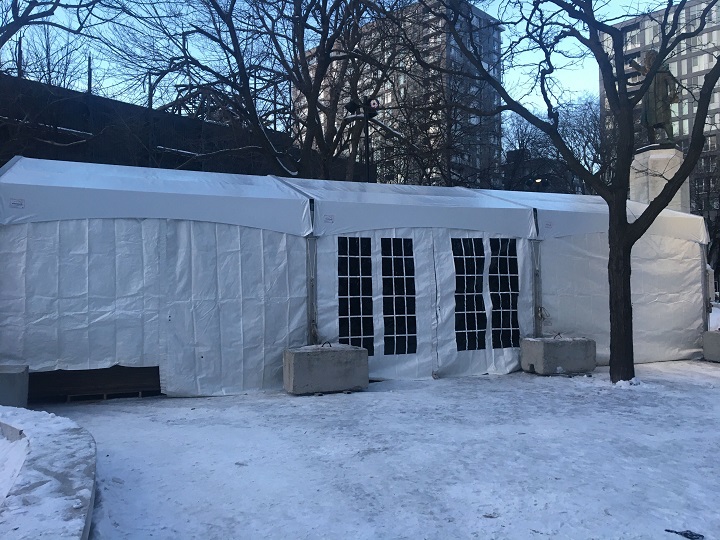A temporary warming centre that is being set up outdoors at Cabot Square in downtown Montreal should be ready by Tuesday evening.

The tent, measuring 20 ft by 45 ft, will allow for those experiencing homelessness the possibility of seeking shelter from the elements every evening between 8 p.m. and 5 a.m. for the next two weeks.
Social workers will be on hand to offer support to those in need and a food service offering coffee and sandwiches will be available outside the tent.
The warming centre, which can accommodate 16 people, is being named in memory of Raphael Napa André.
The Innu man’s body was was discovered inside a portable toilet in the early morning hours of Sunday, Jan. 17, near the Open Door Shelter.
His death prompted calls for Montreal’s homeless population to be exempted from the province’s overnight curfew implemented on Jan. 9 to curb the spread of COVID-19.
The Quebec government repeatedly refused to grant an exemption until a superior court judge found the rule endangered the safety of those experiencing homelessness.
Because of the pandemic, shelters are operating at a reduced capacity.

Get breaking National news
Nakuset, the director of the Native Women’s Shelter — the non-profit which came up with the initiative — says the need for a warm place to stay is urgent.
Cabot Square was specifically chosen because it is an area frequented by many people experiencing homelessness, but there are no nearby places to spend the night
The City of Montreal is paying for the tent and is setting up chairs and a heating system inside. It will also pay for a security guard to keep an eye on the tent while it’s not in use during the day.
According to Nakuset, the province is also contributing $5,000 to the effort, which will go towards hiring Indigenous security guards who have experience interacting with the community.
Over $45,000 was raised by the community, including a $25,000 donation from Mary and Barton Goodleaf owners of Kahnawake’s Host Hotel.
The donations will go towards the day-to-day operations of the warming centre, including hiring eight to 20 staff and community workers from Mamuk and Maison Kekpart.

Nakuset thanked all those who helped make the project a reality, including Innu activist Michèle Audette.
Audette’s greatest hope is that the lines of communication between the various stakeholders will remain open, even after the current health crisis is over.
“Next year we will face another big cold again and less resources for our people, and we have more and more Indigenous people ending on the streets across Canada and more in Montreal, so what can we do?” she said.
“I hope that discussion, that debate and that dialogue will continue and what’s going on will serve as a learning experience, because one life is too much.”
A wreath in memory of André will hang inside the warming centre.








Comments
Want to discuss? Please read our Commenting Policy first.